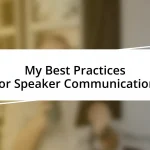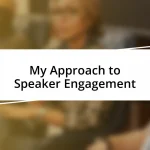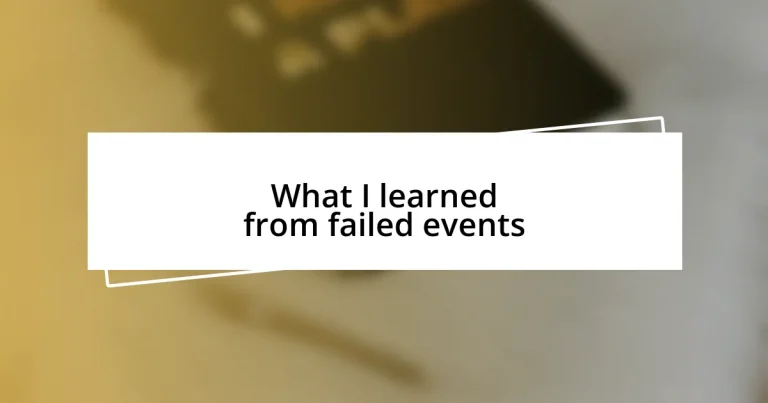Key takeaways:
- Failure should be viewed as a stepping stone and a valuable teacher that fosters resilience and growth.
- Common causes of event failures include poor planning, budget constraints, ineffective promotion, and lack of audience understanding.
- Embracing feedback and practicing self-compassion are crucial for personal growth after setbacks.
- Celebrating small wins post-failure helps shift focus towards positive outcomes and enhances motivation.
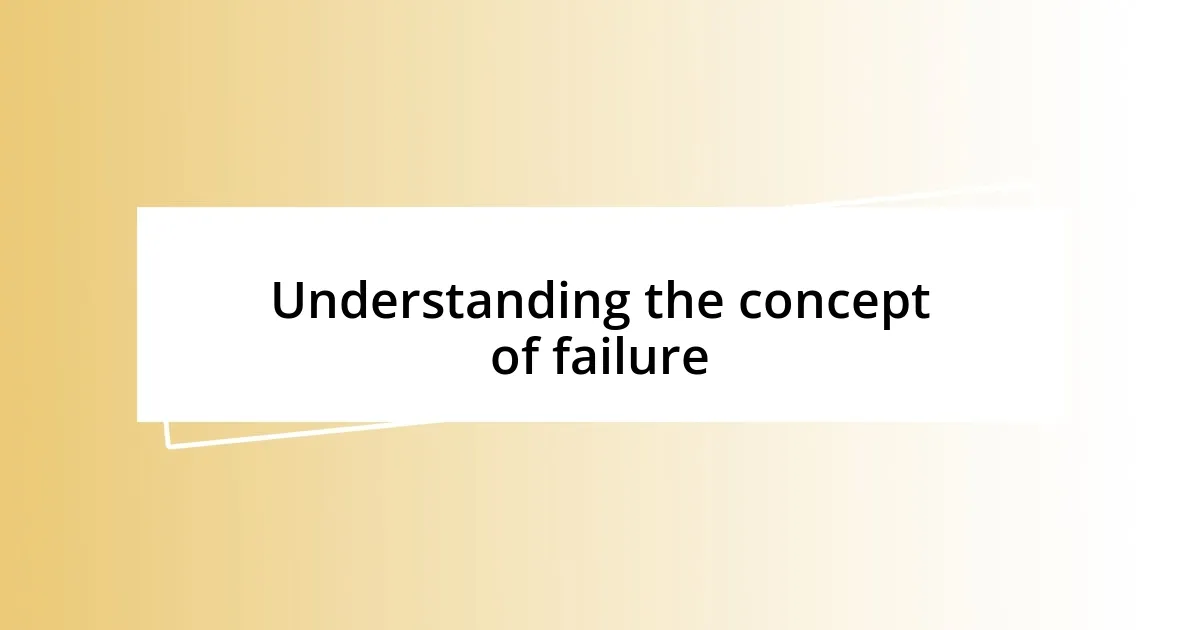
Understanding the concept of failure
Failure can feel daunting, like a dark cloud hanging over us. I remember my first attempt at organizing a community event. Despite pouring my heart into it, the turnout was disappointing, and I felt like I had let everyone down. But looking back, I realize that was just part of the journey.
When I reflect on that experience, I can see that failure isn’t an endpoint; it’s a stepping stone. How many times have we been afraid to try something new because of the fear of failing? I’ve learned that each setback teaches us valuable lessons. We uncover our strengths, discover what doesn’t work, and ultimately, we become more resilient.
I often wonder why we label failure so negatively. It’s like a badge of honor, a mark of bravery for having dared to attempt something significant. Those moments when we stumble can end up being the most enlightening experiences of our lives. In that way, failure transforms into a teacher, guiding us toward better paths in the future.
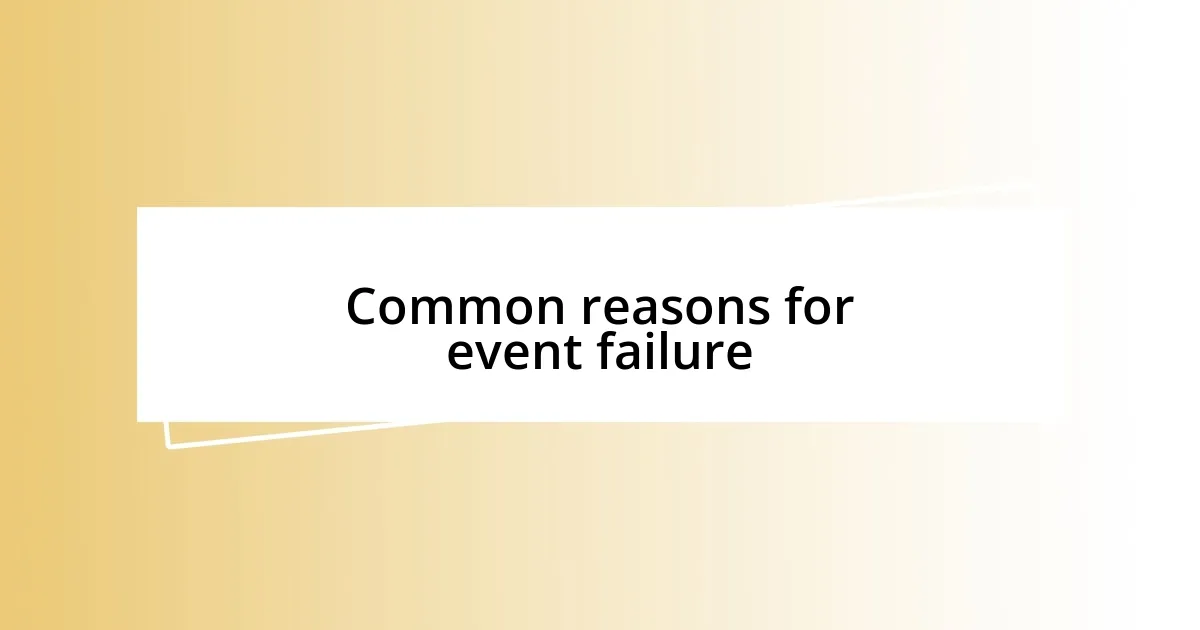
Common reasons for event failure
It’s often in the aftermath of an event that the stark realities of what went wrong become clear. From personal experiences, I’ve found that many events fail due to a lack of proper planning or insufficient understanding of the audience’s needs. I once organized a cultural festival without tailored promotions, assuming that word of mouth would suffice. It turns out, knowing your audience is crucial.
Here are some common reasons I’ve observed that lead to event failures:
- Poor Planning: Inadequate timelines and overlooked logistics can create chaos on the event day.
- Budget Constraints: Underestimating costs or overspending on unnecessary items can deplete funds quickly.
- Ignoring the Target Audience: Failing to connect with attendees’ interests can lead to low engagement and turnout.
- Ineffective Promotion: Relying on a single marketing channel often limits reach; diverse strategies are necessary.
- Lack of Team Communication: Misunderstandings between team members can derail crucial tasks and responsibilities.
Reflecting on these points has made me appreciate the importance of forethought and adaptability in event planning, shaping my approach for future endeavors.
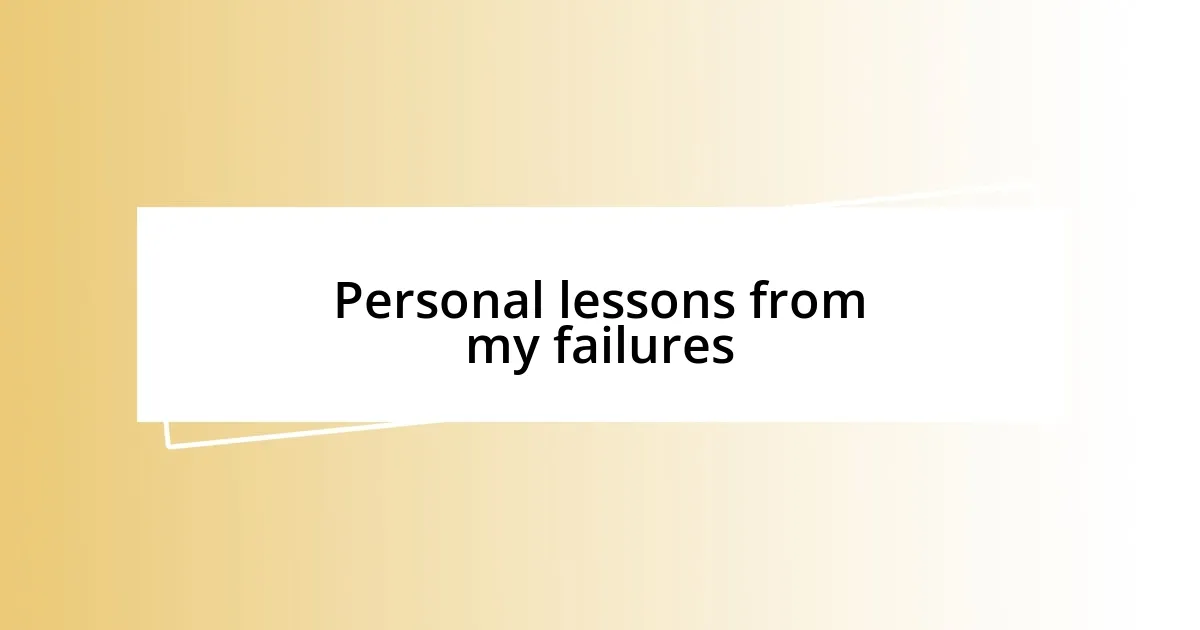
Personal lessons from my failures
When I think about my failures, one lesson stands out clearly: patience is essential. I remember when I rushed to launch an online course without fully testing the content. The outcome was underwhelming—there was little engagement. It hit me hard, but that disappointment pushed me to reevaluate my approach and focus on quality over speed. Now, I’m much more deliberate in planning. I’ve learned to appreciate the journey rather than just the destination.
Another realization I’ve had involves the importance of feedback. After a failed workshop that I thought was a hit, I was shocked when participants expressed dissatisfaction. Initially, I felt defensive, but I chose to reach out and gather honest feedback. It turned out to be one of the best decisions I ever made. Embracing constructive criticism radically improved my future workshops. I now see feedback as an invaluable tool for growth, not a personal attack.
Lastly, I’ve come to recognize the significance of self-compassion. There was a time when I was overly critical of myself after mishaps. I recall an event where I stumbled over my words and barely held it together. Instead of internalizing the mistake, I started reminding myself that everyone has off days. Accepting that vulnerability is part of being human has made all the difference. It allows me to recover and learn without being overwhelmed by shame or fear.
| Lesson | Personal Experience |
|---|---|
| Patience | Rushed an online course launch, leading to low engagement. |
| Feedback | Gained valuable insights after a disappointing workshop. |
| Self-Compassion | Learned to forgive myself after stumbling during a presentation. |
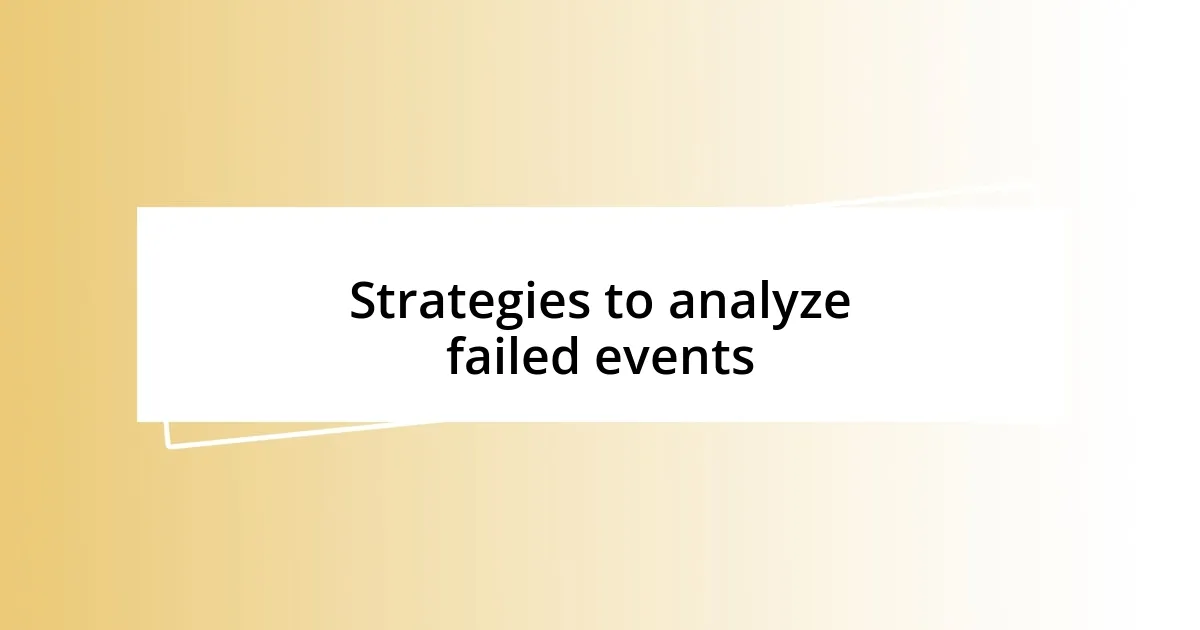
Strategies to analyze failed events
To effectively analyze failed events, I’ve found it helpful to start with a debriefing session. Gathering everyone involved to discuss what happened can unveil hidden insights that might not be apparent in the heat of the moment. I once sat down with my team after a particularly disappointing turnout at a seminar. The candid discussions opened up perspectives I hadn’t considered; it was a reminder that different eyes can see different aspects of a situation.
Next, I highly recommend creating a ‘failure report.’ This involves detailing what went wrong, including timelines, budget issues, and audience engagement metrics. During one event, I noted that the timing of our marketing was off—too late to make an impact. By documenting these elements clearly, I can more effectively pinpoint patterns and refine my strategies for future events.
Lastly, I’ve learned that emotional reflection plays a crucial role. It’s tempting to brush off feelings of disappointment, but I’ve realized it’s vital to sit with them for a while. After one event fell short of my expectations, I took a moment to feel the sting of that failure. By acknowledging my emotions, I turned that pain into a powerful motivator for improvement. How about you? Have you ever found strength in your setbacks? This approach not only fosters growth but also helps build resilience for whatever comes next.
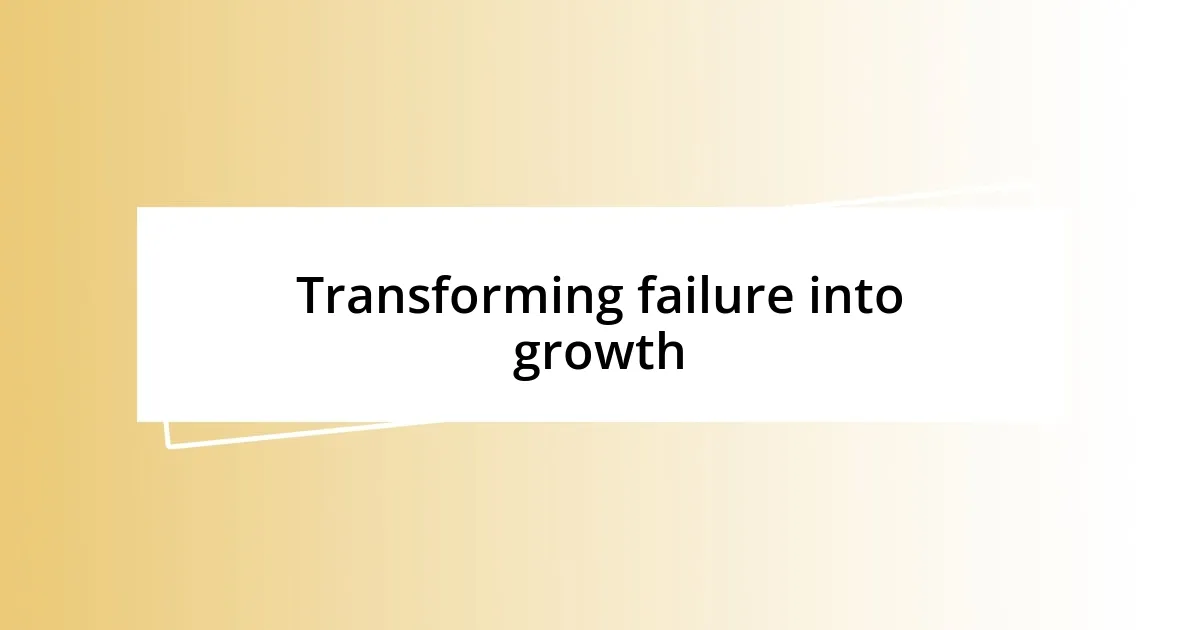
Transforming failure into growth
Failure can be a powerful catalyst for growth if you let it. I recall a time when a grand idea of mine fell flat during an event. I had envisioned an engaging experience, but instead, I was met with disinterest. Instead of allowing that to defeat me, I took a step back. What if I used this moment to explore what truly captured people’s attention? That shift in perspective propelled me to dig deeper into understanding my audience, ultimately shaping my future projects in ways I couldn’t have anticipated.
Another experience comes to mind—a failed partnership that taught me about the art of alignment. I was eager to collaborate with someone whose style really intrigued me. However, our differing visions caused chaos. Initially, I felt frustrated and embarrassed. But reflecting on it later, I understood that this misalignment was crucial. Couldn’t I ensure that future collaborations align with my core values? I now approach partnerships more thoughtfully, which has made a world of difference in creating impactful experiences.
Lastly, I learned that some failures are just stepping stones in disguise. There was this time when I invested significant time and resources into an initiative that didn’t resonate. It felt like I had hit rock bottom. Yet, instead of dwelling on it, I started examining the skills I gained throughout the process. How did this experience make me more resilient? By looking at failure through this lens, I’ve turned setbacks into invaluable lessons, marking my path to personal and professional growth.
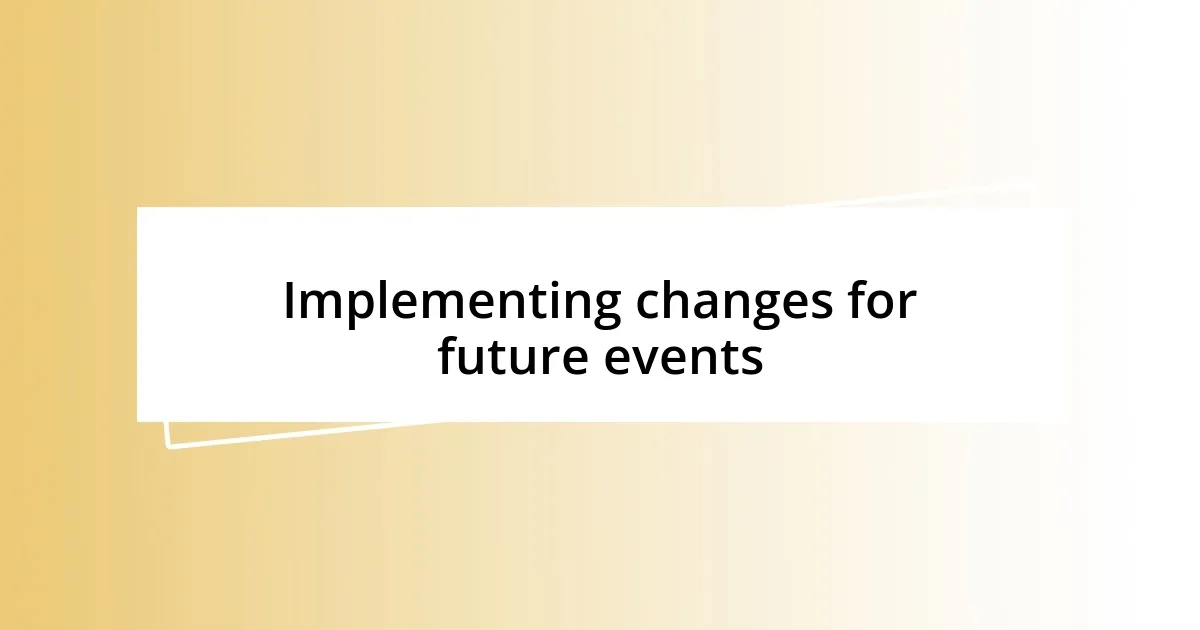
Implementing changes for future events
After identifying the root causes of past failures, I realized the importance of making tangible changes. For instance, during an event plagued by low engagement, I completely revamped the format for our next gathering. Instead of the usual lectures, we introduced interactive workshops. This shift not only revitalized the atmosphere but also fostered deeper connections among participants. Have you ever adjusted your approach only to see a shift in audience response?
Timing became another critical lesson for me. I once found myself in a situation where the event launch was misaligned with industry trends. In response, I set up a calendar to track relevant events and holidays that might affect attendance. This system has proven invaluable; it keeps us proactive rather than reactive. Ever had a moment where simply changing your schedule made all the difference?
Lastly, I embraced feedback like never before. After a disheartening event, I opened up channels for attendees to share their thoughts. The honest feedback I received—from logistics to content—was eye-opening. I remember reading comments that challenged my assumptions. I realized that each piece of feedback is a stepping stone to refining future events, creating opportunities to better meet audience needs. How has feedback shaped your approach to improvement?
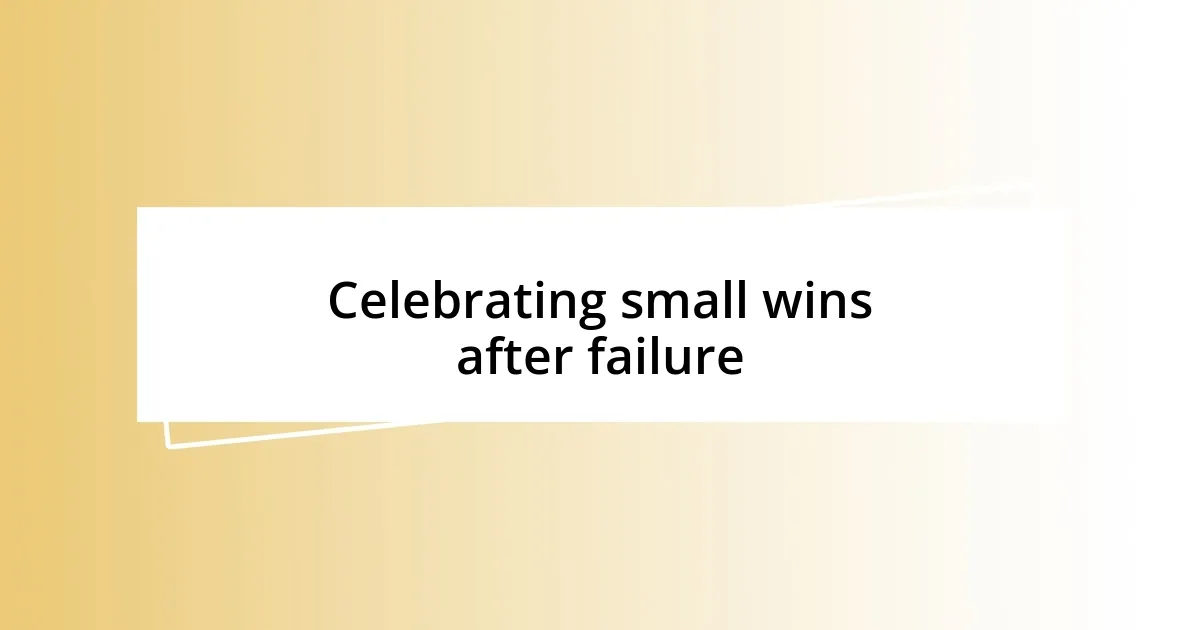
Celebrating small wins after failure
After a setback, I make it a point to celebrate small wins, no matter how minor they may seem. Recently, after recovering from a disappointing event, I focused on the small aspects that went right—like positive conversations with attendees who appreciated my effort. Each small victory served as a reminder that there’s always a silver lining, fueling my motivation to keep pushing forward. Isn’t it amazing how shifting our focus can change our entire perspective?
I remember one instance where an event didn’t meet expectations, but one participant approached me afterward to share how a single workshop had inspired them. Hearing that made me realize these small wins are vital for my growth and reflection. I began jotting down these moments in a journal, creating a collection of positivity to look back on during tougher times. How do you remind yourself of the good that emerges from failure?
Embracing the concept of celebrating small wins has profoundly changed my mindset. It helps to break the cycle of negativity that often follows a failure. One time, after a project flopped, I took a day to reflect not only on the lessons learned but also on the connections I made with my team during the process. We laughed, supported one another, and that camaraderie became a win in itself. Are there moments in your own journey where you’ve recognized the value in celebration, even after setbacks?





